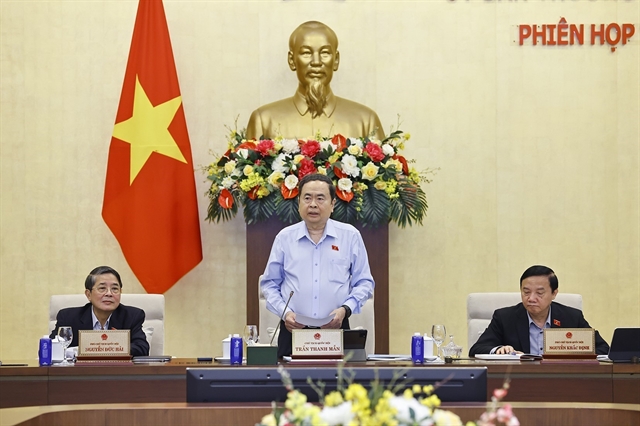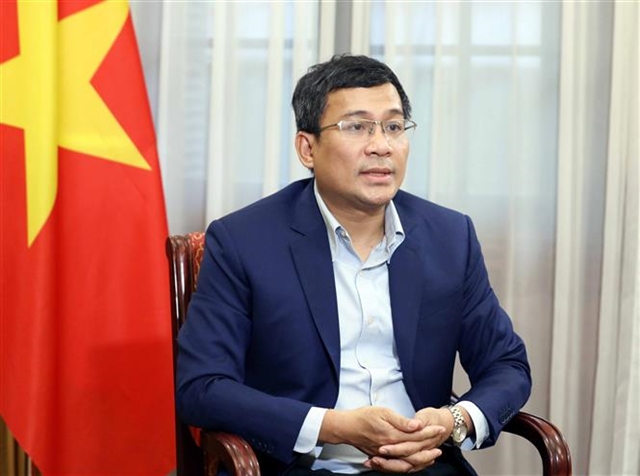 Politics & Law
Politics & Law

Deputy Minister of Foreign Affairs Nguyễn Minh Vũ talked to the press about efforts to deploy "vaccine diplomacy" to find vaccine sources as well as solutions to successfully implement the Government's vaccine strategy.

|
| Deputy Minister of Foreign Affairs Nguyễn Minh Vũ |
Deputy Minister of Foreign Affairs Nguyễn Minh Vũ talks to the press about efforts to deploy "vaccine diplomacy" to find vaccine sources as well as solutions to successfully implement the Government's vaccine strategy.
The shortage of COVID-19 vaccines is not only a problem for Việt Nam, but has become a global emergency. Could you tell us how Việt Nam is going about finding sources of vaccines?
Việt Nam is no exception when it comes to the complicated picture of the global pandemic. So far, the international community has assessed that Việt Nam still has fairly good control over the COVID-19 pandemic. It is the 15th most populous country, but is among the 10 countries with the lowest number of cases and deaths.
However, the fight against the pandemic in our country is still very complicated, especially with this fourth outbreak which is of a much larger scale. It also has multiple sources and multiple strains -- including the Delta variant -- which can spread through the air very quickly.
Vaccination is a very important part of the solution to this ongoing pandemic. Since the outbreak of COVID-19 the Politburo, the Secretariat and the Government have prepared for, and comprehensively directed pandemic prevention and control activities, including the implementation of a vaccine strategy.
This strategy includes three main points: First, finding vaccine sources from outside of Việt Nam; second, strengthening international cooperation in technology transfers for vaccine production; third, producing homemade vaccines to ensure the safe and effective vaccination of the people.
In this vaccine strategy, "vaccine diplomacy" is very important. It is a solution that is both urgent and long-term. We must shore-up a source of vaccines and at the same time create favourable conditions for the recovery of the economy, production, and business activities.
Recently, the vaccine strategy, including "vaccine diplomacy", has been implemented methodically at various levels, especially at the highest level. The General Secretary, State President, Chairman of the National Assembly, the Government and Prime Minister have paid great attention to, and directly participated in this course of action. This includes both bilateral or multilateral diplomacy, and formal or informal activities, via telephone or post to world leaders requesting access to vaccine resources.
The Prime Minister has directed the Ministry of Health, the Ministry of Foreign Affairs and other relevant ministries and branches along with more than 90 overseas Vietnamese representative agencies to also participate.
In hundreds of phone calls and contacts at home and abroad, there is not a single foreign meeting of the Party and State leaders that does not mention cooperating on vaccine acquisition, production, and distribution.
To date, “vaccine diplomacy” has had some positive results. Specifically, through the COVAX mechanism, we have acquired 2.6 million doses of vaccine. COVAX has also committed to giving Việt Nam higher priority in further allocations, and to immediately deliver 2 million doses of the Moderna vaccine, provided by the US on July 10.
Meanwhile, China has provided us with 500,000 doses of vaccines and will probably continue to provide more. The Japanese also pledged to provide Việt Nam with 2 million doses of vaccine, of which 1 million doses were delivered to Hà Nội on June 16, and 400,000 to Hồ Chí Minh City on July 2. Next week, we will receive the remaining vaccines and possibly more.
Russia has also donated 1,000 doses of vaccine and agreed to provide up to 20 million doses of Sputnik V vaccine in 2021. It is currently cooperating with Việt Nam's VABIOTECH to pack and transfer vaccine technology from July 2021.
In addition, the US put Việt Nam on a priority list to receive vaccine aid out of a total of 80 million doses that the country pledged to aid the COVAX mechanism. In addition, Cuba, the UK, Germany, Australia, India and some other countries have also made specific commitments.
Việt Nam has also actively participated in "vaccine diplomacy" in multilateral channels, calling on the international community to come up with solutions to vaccine inequality and vaccine scarcity.
At the Communist Party of China and World Political Parties Summit, on the evening of July 6, Party General Secretary Nguyễn Phú Trọng stressed the urgency of protecting people's happiness and resolving the COVID-19 pandemic as soon as possible.
At the high-level discussion sessions of the United Nations Security Council, the Asia Future Conference, the Partnership Summit for Green Growth, and the Global Goals 2030 (P4G), President Nguyễn Xuân Phúc, Prime Minister Phạm Minh Chính both highlighted the importance of the international community coming together to solve the problem of vaccine shortages, ensuring equitable distribution of vaccines to developing and underdeveloped countries.
Việt Nam have also contributed US$500,000 to the global vaccine fund, which is greatly appreciated.
In the current severe shortage of vaccines globally, the efforts of the whole political system, including the participation of ambassadors and heads of representative missions abroad, Việt Nam has had some early success: obtaining 10 million doses of vaccine in July and August.
In the future, in which direction will advocacy work continue to be deployed to secure more vaccine sources to ensure the successful implementation of the Vaccine Strategy set out by the Government?
The Director General of the World Health Organisation (WHO) forecast that from now to September 2021, the shortage of vaccines will become very serious due to the supply being unable to meet demand, breaks in the production chain and excessive hoarding by developed countries.
The Government and the Prime Minister aim to further accelerate the implementation of "vaccine diplomacy" in the future by focusing on three main directions.
Firstly, we will closely cooperate with relevant ministries and sectors, especially the Ministry of Health, to ensure Việt Nam meets the commitments it has signed with its partners for 150 million doses of vaccine.
Secondly, we will continue to mobilise bilateral partners and international organisations to provide vaccine sources for Việt Nam. We know that vaccines have a shelf life and some countries store more vaccines than they need, so there is a surplus for us to access.
Finally, we will promote deeper and more active cooperation in technology transfers to ensure the long-term, local production capabilities. This is fundamental to ensuring that Việt Nam has a long-term and stable source of vaccines. — VNS




